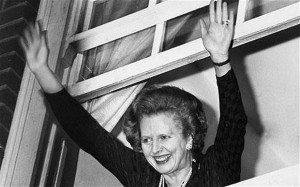RIP Thatcher: Long Live the Cult of the Individual
 In the iconography of 20th century politics, Margaret Thatcher stands among a select few that are instantly recognisable around the globe. And whether her perfectly coiffed hair, pearls and handbag fill you with pride or with loathing, her death this week will evoke vivid memories of her time as Prime Minster and self-appointed Iron Lady.
There will be tributes and testimonies from commentators of all political persuasions and, no doubt, the current party leadership will capitalise on the potential to inspire the party faithful with nostalgia. Away from the politics and the pundits, the death of such a figurehead can serve as a powerful reminder to the business community about the value of a personality in delivering the brand, and the responsibility of aligning the charisma of the individual with the aims of the organisation.
In the iconography of 20th century politics, Margaret Thatcher stands among a select few that are instantly recognisable around the globe. And whether her perfectly coiffed hair, pearls and handbag fill you with pride or with loathing, her death this week will evoke vivid memories of her time as Prime Minster and self-appointed Iron Lady.
There will be tributes and testimonies from commentators of all political persuasions and, no doubt, the current party leadership will capitalise on the potential to inspire the party faithful with nostalgia. Away from the politics and the pundits, the death of such a figurehead can serve as a powerful reminder to the business community about the value of a personality in delivering the brand, and the responsibility of aligning the charisma of the individual with the aims of the organisation.
The figurehead of any organisation is the public image it portrays and that image will rest on personal performance. As with all aspects of reputation management, any failures in the calibre of the figurehead’s performance will generally weigh more heavily against them than any high points will count in their favour. In this regard, Margaret Thatcher has a lot to teach business leaders about remaining consistent, on message and confident in their approach.
But in a marketing context, the value of the figurehead is much greater than their day-to-day responsibilities. Internally it is to lead, to inspire and to establish the cultures of an organisation that will define the way it operates, the way it motivates staff and, ultimately how far it succeeds. Externally, the figurehead is the face behind the brand and all its brand values. It’s a job that requires gravitas, understanding of the bigger picture and the ability to stand out as different in a competitive marketplace.
Too often, companies shy away from the concept of having a figurehead because they believe that the organisation is much greater than the individual, whatever attributes that individual may have. In most cases and in an ideal world, all of that is true: any successful business should be capable of remaining successful without its leader. It’s human nature, however, to want to put a face and a name to an organisation and, at its heart, that’s the role of a figurehead, to humanise a business and ensure that stakeholders feel that they are engaging with an individual.
Margaret Thatcher’s legacy will be debated in the history books for generations to come but part of that legacy must be the cult of the individual; a phenomenon that will be relevant to the business community for generations to come.
